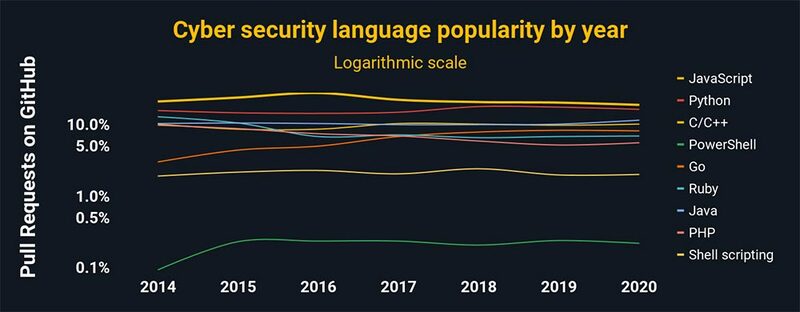What is a Cybersecurity Analyst? Everything to Know
The roles, responsibilities, and salaries of the fastest-growing jobs in the world — cybersecurity and information technology analysts.
Cybersecurity Analyst roles are one of the fastest-growing in the United States and abroad. The demand for these positions is staggering – the U.S. Bureau of Labor Statistics projects 31% growth over the next ten years – much higher than national averages for other roles. We breakdown what exactly Cyber Security Analysts do, their salaries, and more below.
What do cyber security analysts do?
Cybersecurity analysts plan and facilitate security measures to protect a company and/or individuals' computer networks and systems. They search for threats and breaches in security systems, and are often needed for government agencies, healthcare to protect personal data, and a variety of other businesses like those in e-commerce.
Cybersecurity analysts protect networks from intruders, attackers, and hackers – basically, anyone who is trying to breach the system to capture digital files and information not authorized for them.
There are two major focuses for analysts.
-
The protective efforts on the front end, like setting up firewalls and installing software to protect computer networks, and educating coworkers on protective efforts and strategies to avoid hacks.
-
The recovery or reporting efforts around any security breaches and scrutinizes incidents.
The role and responsibilities of security analytics continue to grow as the number of cyberattacks increases. To stay ahead of hackers, analysts must research IT trends, create contingency plans, review suspicious activities, report security breaches, and continually educate the rest of their company on security measures.
Why cybersecurity analysts matter
Cybersecurity analysts matter protect all of our most important information, from medical records to social security numbers to bank account credentials.
What might be surprising is that small business is the target of 43% of cyberattacks and,on average, hackers attack every 39 seconds. What’s even more concerning is that more than 93% of healthcare groups have been a victim of a data break within the last three years, according to Health IT Security. Think about the times you may have fallen victim to a hacker – perhaps an email from your favorite e-commerce platform or bank suggesting you change your login credentials after a "potential breach."
Cyber analysts work to deter all of these dangers.
Cyber security analyst duties
As mentioned above, there many tasks and responsibilities that make up the day-to-day for a cyber security analyst. In preemptive protection, category duties include installing a firewall and encryption tools, reporting breaches or current weak spots in computer systems, staying on top of the latest IT trends, and educating the company on security and preemption efforts.
Even with all the preventative efforts, there are times breachers or hacks may still occur. In the instance of a breach, analysts must document the breach and assess the damage, and also even mount a counterattack to protect the system and sensitive information.
Cybersecurity analyst skills
Soft and hard skills are needed to be successful as a cybersecurity analyst. Hard skills vary from IT skills, analytical skills, knowledge of programming languages, and computer science fundamentals.
The best programming languages to use as a cyber analyst include Python, JavaScript, Go, and C/C++.
Analytical skills in particular are a must when having to decide whether an observed event is worth noting or when asked to evaluate the installation of appropriate tools and countermeasures.

Cybersecurity analysts also need soft skills – problem-solving is key as hacks may be complex and require creative thinking to assess and counter the issue.
Clear communication and the ability to teach others is paramount for cyber analysts as they need to instruct the rest of their business how to respond to and prevent issues.
Further reading: The Cybersecurity Skills Needed to Start Your Career in Cyber
Cybersecurity analyst job outlook
The demand is high for cybersecurity analyst jobs. They’re projected to increase by 31% between 2029. Sometimes these positions are considered entry-level, but they require a strong mix of hard and soft skills as well as a drive for continuous learning, since IT trends are fluid and evolve constantly. Further reading: How to Become a Cybersecurity Analyst
-
In New York City, the average salary is $117k on ZipRecruiter
-
In San Francisco, the average is $85k
-
In Washington, D.C., the average is $96k
-
In Chicago, the average is $100k
Like with many information technology fields, cybersecurity is both future-proof and high-paying. ZipRecruiter offers salaries for almost any location, so we recommend checking out the location that interests you the most.
Cybersecurity can also combine interests across degree fields. For example – you may have a passion for both cybersecurity and health care. You can take those interests and combine them by working for a hospital to ensure data protection.
How to become a cybersecurity analyst
There are two major routes to becoming a cybersecurity analyst.
One is to obtain a computer science degree to other cyber-related bachelor's degree. The other route is to gain training via boot camps and certifications that do not require a four-year degree. Both are great options and provide variety for those based on their learning styles.
Below is the step-by-step guide to starting a career in cybersecurity.
Step 1: Start by seeing if cybersecurity is right for you.
There are several introductory courses offered online without having to dive headfirst into a bootcamp or college degree. A couple to try:
-
The Google IT beginners’ course, offered through Coursera
-
Introduction to Cybersecurity Tools & Cyber Attacks, also through Coursera
-
Flatiron School's Introductory Cybersecurity program
Step 2: Attend a full-time cybersecurity course.
Now that you've established cybersecurity is the career for you there are full-time cyber security boot camps you can immediately enroll in and begin your training. These courses typically take 12-15 weeks and cost $15-$20k. This is steep up front but is a fraction of the cost for a degree at a four-year institution. Not sure where to get started? Below are 3 of the top online boot camps to enroll in.
On-site cybersecurity courses to look into:
BrainStation
-
BrainStation offers a part-time course available completely online. During this course, you will learn cybersecurity fundamentals, threat landscape, and security strategy, and risk management. The program prides itself on including renowned guest speakers.
Level Effect
-
Like Brain Station, Level Effect prides itself on speakers and instructors like offensive and defensive cyber operators from U.S. Intelligence, Department of Defense, and private sector.
-
The course content is focused on the real-world practical application of skill by learning the latest cybersecurity tactics, techniques and procedures.
Online cybersecurity courses to look into:
Evolve CyberSecurity Academy
-
With a part-time schedule, this program can be completed in 20 weeks. It’s offered in-person in Chicago or remotely.
-
The program offers CompTIA Security + Voucher, financing options, job preparation, and an apprenticeship program.
Secureset
-
The CORE cybersecurity boot camp offered by Secureset is a 20-week program consisting of 400 instruction hours and 400 Lab hours. The program is offered in Colorado Springs and Denver, Colorado.
-
Some areas of learning during the program: Network Security, Security Culture, System Security, and Threat Intelligence to name a few.
Flatiron School’s Cybersecurity Engineering
-
The cybersecurity engineering program offered by Flatiron School can be completed in as little as 15 weeks. It is designed for students with a technical background to help start a career in cybersecurity engineering and launch you into the forefront of global tech growth.
-
This program is offered in NYC and D.C. As mentioned earlier, this program is more technical than the analytics course and is more in line with pen testers.
Learn more about whether or not cybersecurity bootcamps are worth it for you
Step 3: Get your certifications.
It is recommended to get the Sec+ certification first and foremost. Beyond that, it is best to obtain some experience in the field as additional certifications can be much more niche or focused on a specific career path in cyber security.
Three other popular certifications
-
Certified Infomation Systems Security Professional certification, or CISSP, is the most in-demand professional certification
-
The second most crucial professional certification is the Certified Information Security Manager certification (CISM)
-
CISA certification is the third most sought-after professional qualification for cybersecurity positions.
Step 4: Execute an effective job search.
With all the skills and tools necessary to be a cybersecurity analyst the final step is landing the actual job. Leveraging Career Services offered by boot camps can be key to success in finding a job. Some boot camps do not provide career services, which should be a determining factor in whether you attend or not.
As a cybersecurity student, you deserve support in your job search.
Flatiron School offers full comprehensive career services to all graduates to help them find their job and successfully start their new careers. Some tips for nailing your interview include: practicing eye contact along with posture during the interview and after following up with a thank-you note to help stand out. Whatever you do, remember: don’t be scared.
Cybersecurity analyst requirements
There are several requirements needed to become a cybersecurity analyst. Most companies prefer those with a degree in information security or any other related field like Computer Science. Having certificates to bolster experience is helpful when applying to positions to better stand out.
Outside of entering the field via a cybersecurity bootcamp or four-year degree program, it is possible to start at an entry-level IT position and work your way up to a cybersecurity role. Some roles to make the jump from include – cybersecurity technician, Incident analyst, and cybercrime investigator. All three of those can translate directly into a more mid-level career as a cybersecurity analyst.
Cybersecurity analyst qualifications
It is possible to enter the cybersecurity field without a degree, but it is critical to work your way up to a role as a cybersecurity analyst by gaining experience in a more entry-level job and getting industry certifications.
Some other options include undertaking an apprenticeship in cybersecurity which combines employment and study to work towards a recognized qualification. Apprenticeships are offered at various levels including degree-level.
Conclusion
Cybersecurity analysts monitor computer infrastructure, databases, computer networks, and information networks to ensure they're protected from cyber threats.
Sometimes also referred to as information security analysts or threat intel analysts, cyber security analysts are tasked with many things including triaging security incidents, developing policies and best practices to disseminate company-wide, protecting networks and computer systems from unauthorized access and attacks, and developing counter attacks to breachers that might occur.
Education is a key aspect of this role as analysts must work across departments, using their expertise to advocate cyber compliance across the business.
Demand for cybersecurity analysts is high and is only projected to grow over the next 10 years.
As more and more businesses shift to online operations, they require cybersecurity analysts to join their team to protect things like customer banking data, personal information, and company data that would be compromising if exposed.
There are two paths to beginning a career as a cybersecurity analyst. One path is to obtain a four-year degree in computer science or a cybersecurity-related field. The other path is to obtain the necessary training and qualifications via a bootcamp.
Will going down this career path be worth it? The short answer is yes. Based on the demand and salaries alone this career path has a promising outlook.
Still unsure if this is the right job for you? We recommend taking some introductory courses to see if there is interest and from there attending a full-time bootcamp to complete the study needed to launch your career in cybersecurity.
Disclaimer: The information in this blog is current as of February 23, 2021. Current policies, offerings, procedures, and programs may differ.



